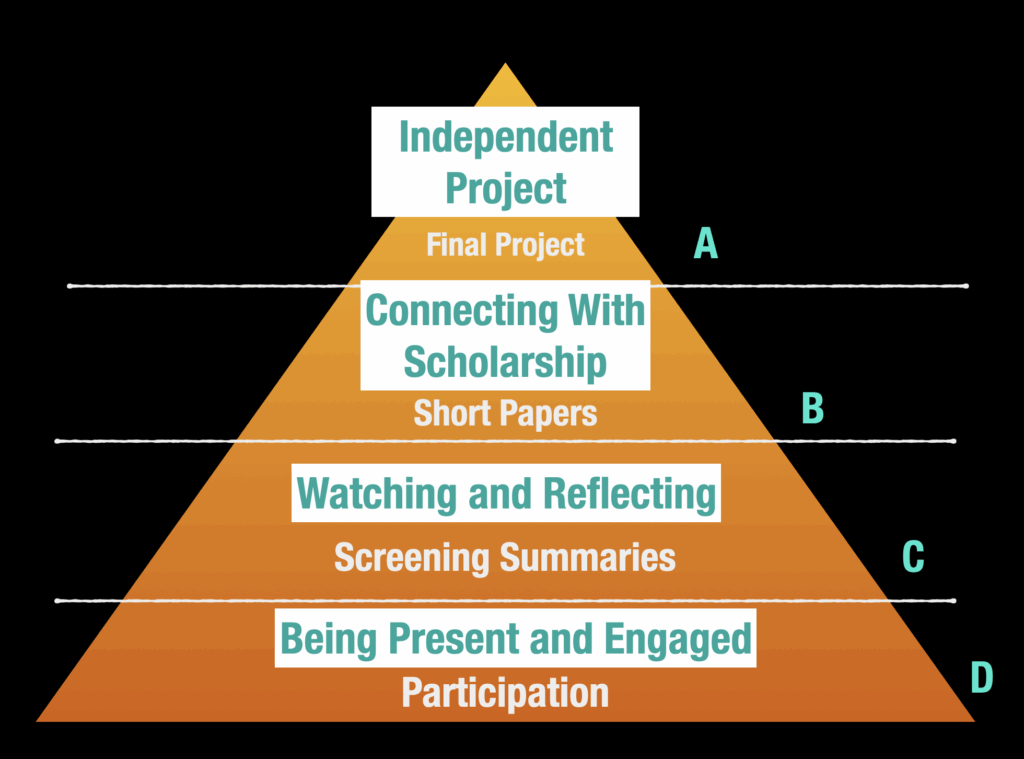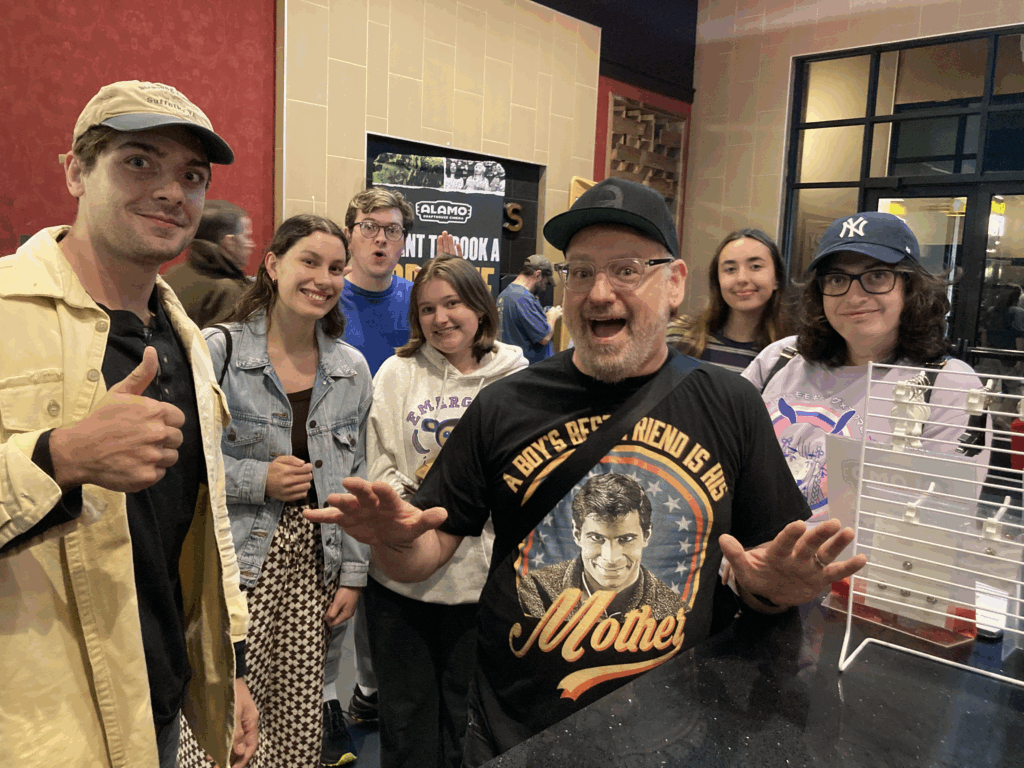In my teaching, I have striven to present critical perspectives on games, film, digital media, participatory culture, and learning. Below are links to current syllabi (from University of Virginia), sample syllabi and informational websites from University of Virginia, but also Indiana University (from 2012 to 2017) and Miami University (from 2010 to 2012). Atop that, I present an extended description of my teaching philosophy regarding Media Studies.
Course Links
Recent Courses:
- MDST3501: The Films of Alfred Hitchcock (Fall 25; course promotional site)
- MDST3501: The Films of David Lynch (Fall 25; course promotional site)
- MDST2508: Designing Play (Fall 25; course promotional site).
Selected Past Courses:
- MDST3559: Media Franchises – Star Wars (Spring 25; course promotional site)
- MDST3912: Adapting Media (Fall 25, course promotional site)
- MDST3883: Superhero Media (Spring 23, course promotional site)
- MDST3510: Games Research (Spring 21; course promotional site)
- MDST3704: Games and Play (most recently offered Fall 24; course promotional site)
- MDST 3712: Interactive Storytelling (most recently Spring 25; course promotional site)
- MDST4559/7559: Critical Game Studies (Fall 20; course promotional site)
- MDST3710: Comics & Sequential Art (most recently Spring 20; course promotional site)
- MDST4251: Histories of Games (Spring, 2010; course promotional site)
- MDST4559: Online Culture and Games (formerly Game Cultures) (Fall, 2018; course promotional site)
- MDST4559: Critical Game Design (Spring, 2018; course syllabus)
- P674: Games, Play, and Learning (Indiana University, Spring 17; syllabus PDF)
- P631: Participatory Culture and Learning (Indiana University, Fall 15; syllabus PDF)
- P674: Designing For Playful Learning (Indiana University, Fall 13; course promotional site)
- IMS211: The Analysis of Play (Miami University, Spring 12; syllabus PDF)
- EDL662: Digital Media & Learning (Miami University, Spring 12; syllabus PDF)
- IMS/ENG238: Narrative and Digital Technology (Miami University, Fall 11; syllabus PDF).
Teaching Philosophy
Over the last several decades of teaching, I have found myself crafting a teaching philosophy that I carry through to all of my courses. Sometimes this approach is a bit alien to students who have come into the University setting from environments in which testing and lecturing are the norm. I have no exams in my courses, and all of my courses are seminars or workshops. So, this is written with an audience of a potentially interested student in mind — if you are looking into my courses, it might be useful to read a bit about how they differ a bit from some others offered at UVA and what I am trying to do with them! Read on!
In recent years, I’ve found it useful to communicate all of this as “my teaching philosophy” to students so they understand the ways that different assignments in my courses line up, as well as understand the overarching goals of each course. While I am currently a professor in Media Studies, my doctoral degree and research were actually in Curriculum & Instruction — an educational research field, and one tied to the Learning Sciences. So, I care deeply about carefully scaffolding what I see as important and empowering learning opportunities into these courses. A core value I have is that each course needs to be structured intentionally, with the goal of helping students build toward the goal of becoming budding media studies scholars. A big goal, I know, but it’s doable! Really, it is!
In all of my courses, I have found it useful to think of four distinct goals that I believe every Media Studies student should engage in within every Media Studies seminar. These can be described as:
- Fostering Engagement
- Developing Critical Reflection
- Connecting to Scholarship
- Individual Research.
That all sounds a bit clinical, but I can break it down for you…
First, every Media Studies course I offer at UVA is based on a foundation of validating and acknowledging student experiences with the media under study. What did you think of the film Freaks? How did playing the “Oil Springs” version of Catan challenge your expectations about what the game was about? How does the industrial perspective on media franchising around the Marvel Cinematic Universe connect with ideas you might have encountered in a different class? Whether the topic of the discussion is a popular streaming series, a lesser-known work of a particular film director, or an experimental role-playing game, student experiences and reactions are foregrounded in each class. We always spend time immersing ourselves in these media, but then I always want us to create room within the class discussion to share our firsthand experiences with these through seminar discussions and activities. Media studies always begins with thinking about our own tastes, interests, and challenges.
Next, it’s probably clear that simply acknowledging our engagement with media just cannot be enough — and so regular assignments are lined up to give each student the opportunity to critically reflect on the media under study. These are typically small, short written or video assignments in which students are tasked with describing what they have experienced, but then also stepping toward a critical perspective on them. How did David Lynch use sound to disorient the viewer in Twin Peaks: Fire Walk With Me? How does the board game Daybreak model a political argument within it? How did Art Spiegelman represent race and ethnicity in Maus? This often manifests as nudging students to thinking about the construction of the medium under study, while in games courses specifically this has leaned into the direction of even giving students the opportunity to think through small redesigns of the games they have been assigned.
Beyond engagement and critical reflection, I believe it is key that all Media Studies courses give students a firsthand experience with relevant media studies scholarship (not textbooks!). Periodically through the semester, students have the opportunity to build on their critical reflections into a longer-form and more formal written or video assignment that incorporates ideas drawn from primary sources in active media studies scholarship. The majority of the class readings in my courses are drawn from primary academic sources — journal articles, selections of scholarly books, etc. — and so engaged tudents learn to put their insights on media into conversation with ongoing scholarly ones. How does Barbara Klinger’s idea of “replay culture” with The Big Lebowski help to explain the cult trajectories of other films? How do you think Brenda Romero’s provocative game Train might challenge our notions of Huizinga’s “magic circle”? How do your experiences with Star Wars toys reflect what Jonathan Gray discusses as the narrative implications of “media paratexts”? Again, this is meant to empower you — to give you the opportunity to see your insights as speaking back to (and sometimes challenging!) the ideas presented by the media studies scholars we read.
Finally, it is my firm belief that there is no meaningful learning in a Media Studies context without some kind of independent project, some kind of space for you to break away from what I’ve designed and find your own path. Why take a Media Studies course without digging deeply into something you’re interested in, something you care about? All students are strongly encouraged to pursue an independent project in each class — this varies quite a bit with the course topic, ranging from research papers to video essays critiquing a motif across films to designing a narrative-based game. In the past few years, I’ve seen an excellent video essay on the “smart girl” trope across decades of teen rebellion movies such as Heathers and Bottoms. I’ve seen research projects on the ways that the Avatar: The Last Airbender franchise has been adapted and readapted into live action form. I’ve seen detailed game prototypes ranging from escape rooms to fully fleshed-out tabletop role-playing games to playable book adaptations rendered entirely in text within Google Forms! What matters most is that you find a thing that you care about which is tied to the course topic, and then I can help you bring all of your work over the term to bear to making it something you can be proud of. Students are provided feedback on multiple steps of this, from initial pitch, to creating progress reports to share with the class, to receiving instructor and peer critique on drafts.
The arc here is one of both learning about the “content” (a simplistic and overused term) of the course but also, at the risk of being redundant, about empowering you to move from appreciating media to becoming a budding scholar of media. That is, students who commit to participating in all of these tasks learn how to move from being a fan of something to thinking critically about it, to incorporate their perspectives with ongoing scholarly ones, to completing work that is driven by their interests.
I should note that most of my courses are specifications graded — I do not often use traditional, inequitable grading systems, as I want to provide you grading systems which allow opportunities to revise work over the term, and multiple opportunities toward your desired grade outcomes.

The image above is from a slide that I shared on the first day of my Spring, 2025 MDST3502: Cult Cinema class, and one similar to slides I’ve shown in all of my classes in the past few years. In it, the big goals I outline here (phrased a little differently) were paired with specific assignments. As you can see here, they’re organized in a rough “pyramidal” shape, and quite intentionally. The bedrock of that class, like all of my courses, was on engagement (Participation), with very regular critical reflection tasks (Screening Summaries), fewer but longer opportunities to engage with scholarship (Short Papers), and then a culminating independent research opportunity (the Final Project). As you can see, each assignment also lines up with the minimum expectations for a final course letter grade, too — so, to earn an A, each student needed to complete and meet expectations on a Final Project — giving students the opportunity to know from day one the amount of work they need to complete to earn the grade they desire.

Along with specifications grading, I am continually experimenting with other elements of my instruction. In recent years, this has meant seeking out and being awarded a Center for Teach Excellence grant exploring the use of AI tools in a class. It has meant working toward revising how regular writing can work in my classes through participation in the UVA Faculty Seminar on Writing. It has also meant more exploration of media outside of the classroom, including a fun recent class screening of Alfred Hitchcock’s film Psycho at the local Alamo Drafthouse (see above). And, occasionally, it has meant seeing how our class activities can sync with other classes around Grounds — including my Interactive Storytelling course playing the live-action role-playing game Ghost Court Dave Dalton’s DRAM3430: Improvisation course a few years ago. Media connects with everything and we need to continually experiment with how we teach it!
If you are a current or prospective student or any are just interested and have any questions, please don’t hesitate to reach out by emailing me at sean [dot] duncan [at] virginia.edu